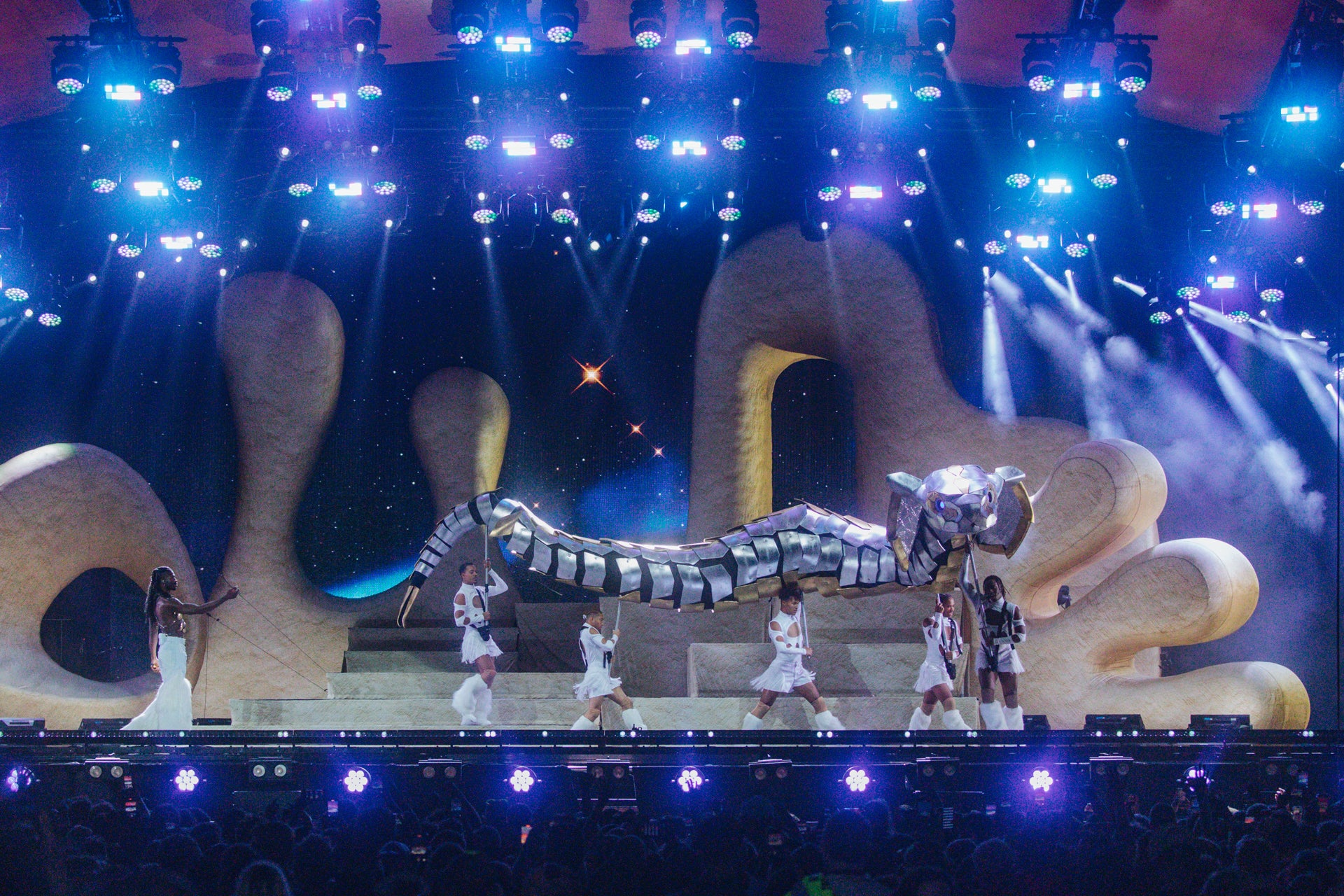Roskilde 2023 review: A triumph for Rosalìa, Rina Sawayama and Lizzo at Denmark’s answer to Glastonbury
It was sultry, ultra-feminine pop music that pumped the strongest through the festival’s veins this year

Your support helps us to tell the story
This election is still a dead heat, according to most polls. In a fight with such wafer-thin margins, we need reporters on the ground talking to the people Trump and Harris are courting. Your support allows us to keep sending journalists to the story.
The Independent is trusted by 27 million Americans from across the entire political spectrum every month. Unlike many other quality news outlets, we choose not to lock you out of our reporting and analysis with paywalls. But quality journalism must still be paid for.
Help us keep bring these critical stories to light. Your support makes all the difference.
“Roskilde, this is my favourite festival,” declares an emotional, latex-clad Lizzo on the final night of Denmark’s answer to Glastonbury. She’s talking to the 130,000 fans in the field in front of her, who are illuminated by the stage’s pink and red neon lights. “I could live here,” she admits to the crowd, before half-jokingly accepting a fan’s marriage proposal and the spousal citizenship that comes with it.
It’s easy to think Lizzo is dishing out flattering one-liners to please her European crowd. But four days at the festival – which happens in Denmark’s fourth largest “city” in terms of population – has left me inclined to agree.
Each year, the event spans an entire week, with Danish acts performing Saturday to Tuesday before the international acts roll in from Wednesday to the following Saturday. It’s a bucket-list billing for any local or international musician aware of the value of the heritage-rich non-profit festival, which has been running since 1971. Nirvana, David Bowie and Rihanna have all performed on the iconic Orange stage. This year’s lineup – Kendrick Lamar, Burna Boy and Queens of the Stone Age to name a few – was no anomaly to its meticulous annual programming and genre-spanning offering. But it was sexy, ultra-feminine pop music that pumped the strongest through the festival’s veins this year.
On Thursday night, Rina Sawayama’s powerful, angsty set seamlessly transfigures from a moving theatrical show into a masterclass in sultry pop bangers. Whether wearing a white Victorian-style gown for “Hold The Girl” or lassoing a leather whip above her head in “This Hell”, Sawayama has the crowd in the palm of her hands. In the aftermath of the buzz of her Glastonbury set, where she made a dig at 1975 frontman Matty Healy’s recent racism controversy, Sawayama told Danish fans “The silence is deafening, f***** joke, Roskilde let’s fill that silence,” before unleashing her wrath in “STFU”.
The spectacle continues later into Thursday night, as American popstar Lil Nas X asks the crowd: “Y’all wanna see my snake?” before ushering a silver, 100-metre-long puppet snake onto the stage, which is joined by a gargantuan horse, mounted by the musician, and a human-sized flying crane. He gets his viral country-rap crossover track “Old Town Road” out of the way early on, as the 24-year-old proves he is no one-hit wonder, but a fully-fledged pop idol entirely worthy of this headline slot, his show a raucous moment for Gen Z queer pop.
Friday’s headliner, the buzzy Spanish singer-songwriter Rosalìa is, by some margin, the highlight of the weekend. Her angelic voice lifts us into an infectious Flamenco-infused beat that pulsates through the crowd in “DESPACHÁ” and “BESO”, the rhythm only pausing for her vulnerable ballad performances of “Hentai” and “LLYM”.
These intimate numbers, though, are disturbed by the thunderous sound of Blur – Friday’s headliner playing simultaneously on the main stage. Still, Rosalìa takes it in her stride and tells the crowd: “I love Blur”, but it’s clear she’s struggling to get in the zone with all that background noise.
In the end, it is the scheduling at Roskilde that is its only flaw. There was simply too much good stuff to choose from: festivalgoers felt cheated in having to decide between two mammoth headliners, with many missing out on the shows altogether as it was difficult to get a good spot close to the stage.

Still, though, the smaller acts on the lineup prove that the festival’s bookers have their ear to the ground. There is American musician Sudan Archives with her falsetto screams, swirling synths and trappy beats contrasting her Irish-jig-style violin playing. Then south London’s psychedelic R’n’B’ singer Greentea Peng and American indie pop singer Caroline Polacheck also rouse crowds on the Arena stage in balmy afternoon slots. Over on the Apollo stage, international amapiano DJ, Uncle Waffles, breeds some Step-Up-worthy dance cyphers.
Enjoy unlimited access to 100 million ad-free songs and podcasts with Amazon Music
Sign up now for a 4 month free trial (3 months for non-Prime members)
Enjoy unlimited access to 100 million ad-free songs and podcasts with Amazon Music
Sign up now for a 4 month free trial (3 months for non-Prime members)
The Danish acts still manage to cut through the noise of the international headliners throughout the weekend. Native rapper Kesi and pop singer-songwriter Tobias Rahim both headline the main stage as Danes recite their lyrics like it is their national anthem. The Danish fans left an impression on the musicians, too, with Lizzo’s earlier remarks being echoed, ad nauseam, throughout the weekend, with the crowd praised for its high-energy and unforgettable singalongs.
The festival’s line-up remains peerless, and in my opinion, is massively overlooked in the mainstream festival circuit. Roskilde is also remarkably clean and well-thought-out – even the junk food being served tastes biazzarely healthy – and, unlike its UK counterparts, the floor doesn’t smell like wee. But above all, despite some frustrating scheduling clashes, this year’s Roskilde was a triumph for women in pop.



Join our commenting forum
Join thought-provoking conversations, follow other Independent readers and see their replies
Comments